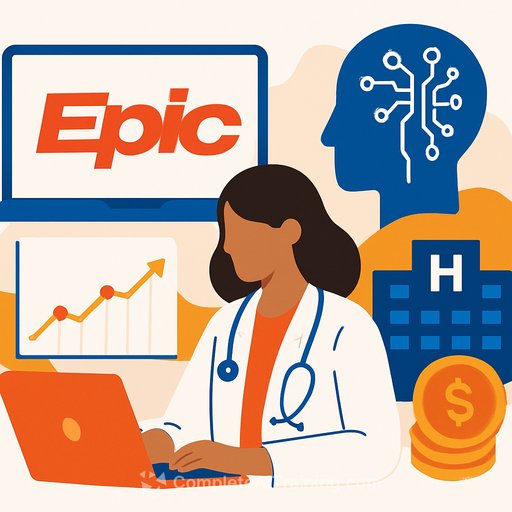Epic Systems: Dominance in U.S. Healthcare Technology
Epic Systems stands as a dominant force in U.S. healthcare technology. By 2025, it is expected to hold 37.7% of the acute care hospital EHR market and an impressive 43.92% in the ambulatory sector, surpassing competitors like Oracle and Veradigm. Epic’s strength goes beyond market share, rooted in its deep integration of artificial intelligence (AI) and near-monopoly on electronic health records (EHRs). For investors and healthcare professionals alike, the key question isn’t if Epic will keep growing, but how its control over healthcare data and workflows will create lasting value.
AI as an Indispensable Ally
Epic’s AI approach centers on embedding artificial intelligence as a trusted partner within clinical workflows. At their 2025 Users Group Meeting, CEO Judy Faulkner revealed over 200 AI enhancements under development, including Emmie for patients, Art for clinicians, and Penny for administrative tasks. These tools aim to transform healthcare delivery economics.
- Emmie: An AI assistant integrated into MyChart, Emmie handles patient questions about lab results, schedules appointments, and suggests preventive screenings. This boosts patient engagement while shifting administrative load from health systems to Epic’s scalable cloud.
- Art: Designed for clinicians, Art automates documentation, predicts clinical needs like blood pressure trends, and drafts notes. It saves about 20% of a physician’s documentation time, reducing burnout and increasing productivity.
- Penny: Focused on revenue cycle management, Penny generates appeal letters for denied claims and speeds up medical coding. This leads to faster reimbursements and lower operational costs for healthcare providers.
Together, these AI tools form a comprehensive ecosystem linking Epic’s EHR to all care aspects. The more health systems rely on Epic’s AI, the harder it becomes to switch to other platforms.
EHR Supremacy as a Fortified Barrier
Epic’s leadership in EHRs creates a strong barrier to entry. Its Cosmos dataset contains over 300 million patient records—de-identified but invaluable for training AI models. Early-stage Cosmos AI aims to predict readmissions, heart attacks, and other critical events, giving Epic a clear edge competitors struggle to match.
The challenges for new entrants include:
- Regulatory complexity: Compliance with HIPAA, HITECH, and ONC rules requires years of investment.
- High switching costs: Health systems adopting Epic’s “one patient, one record” model face significant disruption if they switch platforms.
- Interoperability depth: Epic’s integration with telemedicine, genomics, and cloud services creates a seamless experience difficult for rivals to copy.
Oracle, Epic’s closest competitor, struggles with implementation issues and customer dissatisfaction. Smaller companies like Cerner and Allscripts lack the scale to compete effectively. For Epic, the EHR is more than software—it’s a platform that locks in clients for decades.
Financial Landscape and Shareholder Value
Epic’s financial results reflect its market strength. Revenue climbed from $3.2 billion in 2019 to $4.9 billion in 2023. In 2024 alone, the company onboarded 176 new facilities. CEO Judy Faulkner’s net worth has grown to $7.8 billion, reflecting the company’s positive trajectory.
The AI-powered tools add new revenue streams. For example, Cosmos AI’s analytics can command premium pricing from health systems aiming to reduce readmissions. Partnerships with Microsoft and Nuance (via Dragon Copilot) position Epic to benefit from ambient AI technologies that simplify documentation with natural language processing.
Investment Prospects
Epic’s control of EHRs combined with advanced AI offers a unique investment opportunity. The company’s hold on healthcare data and operational workflows ensures recurring revenue from large health systems. Its AI innovations open new monetization paths.
However, Epic remains privately held, limiting direct investment options. Public companies like Oracle (ORCL) and Cerner face major hurdles competing against Epic’s deep entrenchment. Startups working on healthcare AI often rely on Epic’s ecosystem for integration.
For indirect exposure, consider companies supporting Epic’s AI infrastructure, such as Microsoft (MSFT), which provides cloud and AI services. Health systems using Epic’s EHR may also benefit from improved efficiencies.
Conclusion
Epic’s AI-driven growth is a long-term development reshaping healthcare delivery. By combining EHR dominance with AI innovation, Epic has built a strong monopoly positioned to deliver sustained value over many years. For healthcare professionals and investors, data is the critical asset—and Epic is the key custodian.
Your membership also unlocks:





